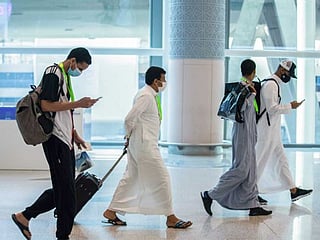Saudi Arabia: After months, Umrah pilgrims start to trickle in
6,000 citizens, residents within the kingdom allowed to perform Umrah daily

Also In This Package
Abu Dhabi: Hundreds of resident pilgrims were welcomed in the holly city of Mecca in Saudi Arabia on Sunday to perform Umrah, Islam’s minor pilgrimage, amid strict health protocols to stem the spread of COVID-19, local media reported.
Umrah pilgrims circled the sacred Kaaba - a cubic structure inside Mecca's Grand Mosque towards which Muslims around the world pray - along socially distant paths. The Kingdom is gradually resuming the year-round umrah pilgrimage for Muslims, seven months after it was suspended because of the coronavirus pandemic.
Also Read: Pictures: Rice farming in Saudi Arabia
It suspended the umrah in March and later scaled back the annual haj in a blow to millions of pilgrims around the world amid fears that the coronavirus could spread to Islam's holiest sites.In the first stage, 6,000 citizens and residents within the kingdom will be allowed to perform the umrah daily from October 4, the ministry said in a statement published by the official Saudi Press Agency.
Visitors from outside from November 1
Visitors from outside the kingdom will be permitted from November 1, when umrah's capacity will be raised to 20,000 pilgrims per day, the ministry added.
The umrah, which refers to the Islamic pilgrimage to Mecca that can be undertaken at any time of year, usually attracts millions of Muslims from across the globe each year.
The ministry said umrah would be allowed to resume at full "natural capacity" once the threat of the pandemic is eliminated.
The decision to resume umrah was in response to the "aspirations of Muslims home and abroad" to perform the ritual and visit the holy sites, the ministry added.
The decision comes after the kingdom organised the smallest haj in modern history in late July, with only up to 10,000 Muslims allowed to take part in total - a far cry from the 2.5 million who participated last year.
Health authorities said no coronavirus cases were reported at the holy sites during the haj, one of the five pillars of Islam and a must for able-bodied Muslims at least once in their lifetime.
The haj and umrah pilgrimages are a massive logistical challenge, with colossal crowds cramming into relatively small holy sites, making them vulnerable to contagion.
The kingdom has sought to contain a spike in infections, which have now risen to 336,000 cases - the highest in the Gulf - and over 4,800 deaths.
But Saudi Arabia has also reported a high rate of recoveries, which surpassed 320,000 on Saturday.
Last month, Saudi Arabia partially lifted its suspension on international flights, six months after travel curbs were imposed due to the pandemic.
Saudi Arabia looks to expand capacity in Mecca to accommodate more than 30 million visitors per year, part of the Vision 2030 strategy to advance growth and tourism.
Separate from the haj, umrah is a general Islamic pilgrimage that may be undertaken any time of the year. While not compulsory, it is deemed a way to strengthen faith and ensure a more complete haj experience.
Umrah rites are especially popular during Ramadan, when able-bodied Muslims fast during daylight hours as one of the five pillars of Islam.
Sign up for the Daily Briefing
Get the latest news and updates straight to your inbox









